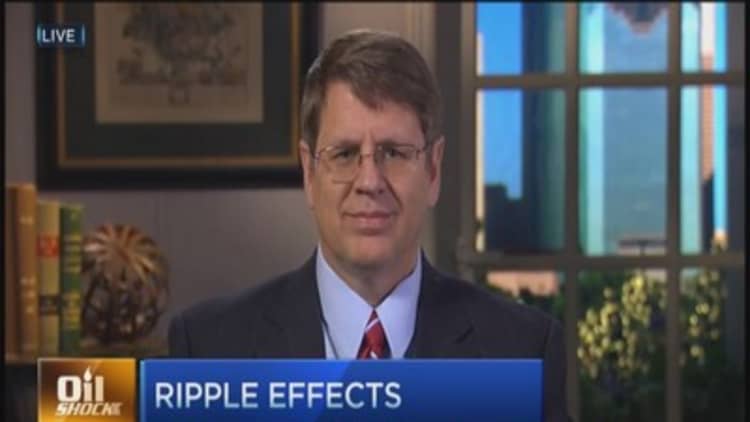
The oil industry is in "dire straits" and is about to face a rude awakening when it comes to jobs, Stephen Schork, founder and editor of The Schork Report, told CNBC Friday.
U.S. crude posted its seventh-straight weekly loss, settling at $48.36 a barrel Friday. dropped to $48.90 earlier in the day and was last trading at around $50.
"We have to figure out why are prices crashing … so far so fast," Schork said in an interview with "Closing Bell."
In fact, gasoline prices in December had the 10th-largest month-on-month decline ever, and all previous declines were because of specific events such as recessions, terrorism and Hurricane Katrina, he noted.
"The industry is in dire straits at this moment," Schork said.
Read More Oil's fall could make you better off
The collapse of oil is expected to lead to job losses in the sector and Texas will be among those states particularly hard hit. The Dallas Federal Reserve anticipates that the Lone Star State will lose about 125,000 jobs in the industry by the end of June, Schork said.
"That is a significant hit to the economies of Texas and to the general economy," he said, noting that the jobs typically pay about twice the private-sector weekly earnings of $850 a week reported by the Bureau of Labor Statistics.
However, Schork thinks that, overall, many oil-related jobs will remain in place for the majority of 2015 because there is a lot of debt sunk into the ground that must be pulled out.
"You are going to have to keep people employed just to help service the debt that's in there," he said. "But once those sunk costs are recovered or they're mitigated to a certain extent ... that's when I think the other shoe begins to drop."
"It's about to be a rude awakening for a lot of people out there."
Read More Job creation pushes higher, rate falls
Patrick Jankowski, regional economist and vice president of research at the Greater Houston Partnership, expects exploration budgets to be cut by 30-35 percent, which will result in about 9,000 fewer wells being drilled.
However, he thinks Houston will weather the storm. While he believes there will be a production decline starting in 2016, he doesn't think it will stay that way long.
"There's going to be a cycle but it's going to be a short cycle, and probably by the end of 2016 we'll see prices go back up," he said.
Jankowski said the question facing the oil companies is whether they should let workers go that they'll need in 12 to 18 months.
"Do you find out some way to hold onto them, knowing that they're going to be hard to find if you let them go when prices go back up?" he said.
Read MoreTime to buy these oil plays: Pro
—Reuters contributed to this report.


